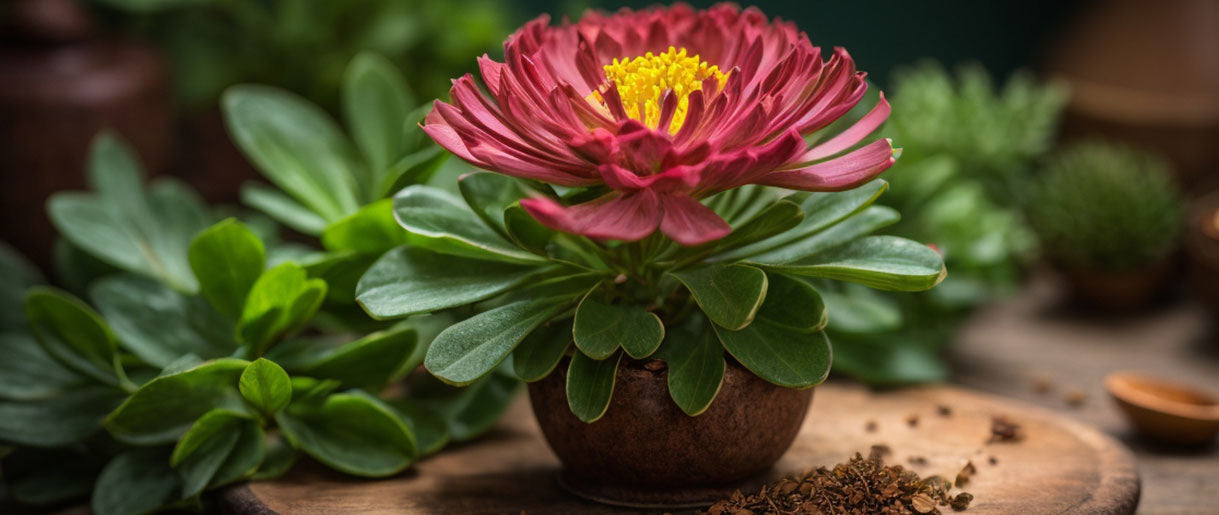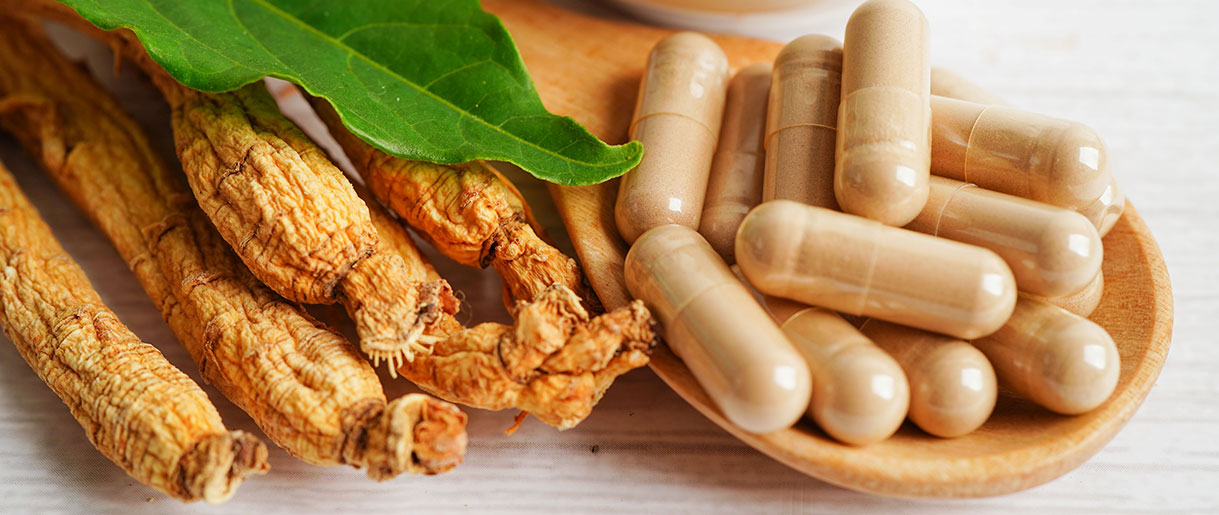While Rhodiola is known for its vitality-boosting and fatigue-fighting properties, Ashwagandha is a star in stress relief and emotional balance. But it's their combined effects that are truly remarkable.
Imagine a natural solution that energizes your body and soothes your mind, creating a perfect harmony of relaxation and vigor.That's the magic of Rhodiola and Ashwagandha together.
In this article, we dive deep into how these herbs work in tandem to amplify your health and wellness. From enhancing mental clarity to improving physical endurance, the duo offers a holistic approach to managing stress and boosting energy.
Join us as we explore the powerful synergy of Rhodiola and Ashwagandha and learn how they can be a game-changer in your health regimen.
Understanding Rhodiola: The Energy Enhancer

Ever heard of Rhodiola? This remarkable herb, a hidden gem from traditional medicine, is rapidly gaining recognition for its impressive energy-boosting properties (1). Known for enhancing mental and physical energy (2), Rhodiola isn't just another supplement; it's a natural game-changer in boosting health and vitality.
- Boosting Mental Energy and Focus: Taking Rhodiola has been linked to improved cognitive function and mental focus, making it a favorite among students and professionals. This is one of the reasons most people put it in the morning routine checklist, as it allows them to get energy in the morning for the day ahead.
- Enhancing Physical Performance: Athletes praise Rhodiola for enhancing physical performance and muscle strength, making it a valuable ally in sports and fitness regimes (3).
- Combatting Fatigue: One of the most celebrated health benefits of Rhodiola is its ability to combat fatigue (4), providing increased energy levels for your day-to-day activities.
- Supporting Sexual Health: Research suggests potential benefits of Rhodiola in improving sexual function (5), adding to its diverse health benefits.
- Bolstering the Immune System: Regular intake of Rhodiola may also support the immune system (6), contributing to overall well-being and resilience against illnesses.
Rhodiola is more than just a traditional remedy; it's a testament to the wisdom of ancient practices, backed by modern scientific research.
Whether boosting your mental energy for better focus and concentration or enhancing your athletic performance, Rhodiola offers a natural, holistic approach to improving your health.
Ashwagandha: The Stress Reliever

Have you felt the weight of stress on your shoulders? Enter Ashwagandha, one of the most popular adaptogen herbs, hailed for its remarkable stress-relieving properties.
This ancient herb has been a cornerstone in traditional medicine for ages, and modern research is now catching up, showcasing its ability to manage stress and improve mood.
- Mastering Stress Management: Ashwagandha is known for reducing stress by regulating cortisol levels, the body's primary stress hormone (7). In addition to helping the body cope with stressors, this herb guarantees reduced stress.
- Elevating Mood and Combatting Anxiety: Regular intake of Ashwagandha has been linked to improved mood and reduced symptoms of anxiety and depression (8).
- Positive Impact on Men's Health: Studies indicate significant benefits of Ashwagandha for men's health, particularly in managing stress and promoting overall well-being.
- Regulating Blood Pressure and Cortisol Levels: By helping to maintain healthy blood pressure (9) and cortisol levels, Ashwagandha supports overall physical and mental health.
Managing stress effectively can feel like an uphill battle in the hustle of our daily lives. That's where Ashwagandha steps in. It's more than just a supplement; it's a natural ally in your mental wellness and stress relief journey.
The Synergy of Rhodiola and Ashwagandha

Have you ever imagined the combined power of Rhodiola and Ashwagandha? These two adaptogenic herbs, each with unique strengths, combine to create a synergy that's more than just the sum of their parts.
Rhodiola, often called Arctic Root, and Ashwagandha, also known as Winter Cherry, hail from distinct regions—the cold Arctic and the warm Middle East, respectively. Yet, their similar properties magnify when they unite, offering a holistic solution to modern-day wellness challenges.
- Complementary Effects on Mind and Body: Combining Rhodiola and Ashwagandha can significantly improve cognitive function and concentration while providing a calm, focused state of mind. These herbs work together to reduce stress and ease symptoms of anxiety, offering a balanced approach to mental wellness.
- Enhanced Energizing and Calming Benefits: While Rhodiola is known for its energizing effects, Ashwagandha brings a calming influence, making their combination ideal for maintaining energy levels without the jitters. This balance is perfect for those who need to stay alert yet calm, such as during intense periods of study or work.
- Physical Health Benefits: The synergy of these herbs may contribute to improved sleep quality and enhanced memory. Some studies suggest potential benefits in areas like sperm quality, indicating broader implications for overall health.
The combination of Rhodiola and Ashwagandha represents a powerful alliance in the world of herbal supplements. Together, these two herbs offer a comprehensive approach to preventing disease and enhancing overall health and well-being.
Whether you're looking to improve your mental clarity, manage stress, or maintain a sense of calm and concentration, taking Ashwagandha and Rhodiola together could be the key to unlocking a more balanced, healthier you.
Practical Applications and Dosage

Incorporating Rhodiola and Ashwagandha into your daily regimen can be a game-changer for your overall well-being. But how do you get started?
Understanding the right dosage and the best form to take these herbs is key to maximizing their benefits while minimizing potential side effects.
Also, knowing the best time to take Rhodiola Rosea and Ashwagandha could ensure ease of use. Let's break down the practical aspects of using these powerful adaptogens together.
- Forms of Rhodiola and Ashwagandha: These herbs are available in various forms, such as capsules, powders, and teas. Capsules are convenient for those on the go, while powders can be mixed into smoothies or other foods for a more integrated approach. Teas offer a soothing way to ingest these herbs and can be a relaxing ritual in your daily routine.
- Recommended Dosages: The ideal dosage can vary based on individual needs and health goals. For Rhodiola, a general guideline is 100-300 mg daily, taken in the morning to utilize its energizing effects. For Ashwagandha, a typical dosage ranges from 300-500 mg daily, preferably in the evening due to its calming properties.
- Combining for Enhanced Benefits: When taking Rhodiola and Ashwagandha together, start with lower doses of each to observe how your body copes. This combination can be particularly beneficial for those looking to reduce stress and increase mental resilience, especially if you're balancing high-stress environments or intense exercise routines.
- Precautions and Potential Side Effects: While generally safe, these herbs can interact with certain medications and may not be suitable for everyone. Potential side effects can include digestive issues or changes in sleep patterns. It's crucial to consult with a healthcare professional before starting, particularly if you have any existing health conditions or are pregnant.
By understanding these natural herbs, you can harness their full potential to reduce symptoms of stress and anxiety and bolster your mental resilience and physical energy. Whether you want to improve your daily performance or find natural ways to manage stress, Rhodiola and Ashwagandha can be valuable allies on your journey to optimal health.
FAQs About Rhodiola And Ashwagandha Together
When Is The Best Time To Take Rhodiola And Ashwagandha Together For Stress Relief?
The best time to take Rhodiola and Ashwagandha together for stress relief is in the morning or early afternoon. Rhodiola is known for its energizing effects, so taking it in the morning can help kickstart your day with increased alertness and energy.
While also beneficial for stress relief, Ashwagandha tends to have calming properties, making it suitable for early afternoon use to help manage stress without causing drowsiness. This timing ensures that you can harness Rhodiola's energizing benefits while Ashwagandha's calming effects help mitigate stress throughout the day.
Can I Take Rhodiola And Ashwagandha With Other Medications Or Supplements?
It's essential to exercise caution when taking Rhodiola and Ashwagandha with other medications or supplements. These herbs can interact with certain medications, potentially altering their effects.
For instance, Rhodiola may interfere with medications for mood disorders, while Ashwagandha could interact with thyroid, blood pressure, or diabetes medications. Additionally, combining these herbs with other supplements, especially those with similar properties, may increase the risk of adverse effects.
Therefore, it's essential to consult a healthcare professional before combining Rhodiola and Ashwagandha with any other medications or supplements to ensure safety and avoid potential interactions.
Can I Take Ashwagandha And Rhodiola Together If I Have A Medical Condition Or Am Pregnant/Breastfeeding?
If you have a medical condition or are pregnant/breastfeeding, it is advisable to consult a healthcare professional before taking Ashwagandha and Rhodiola together.
These herbs can affect hormonal balance, blood pressure, and other bodily functions, which might be contraindicated in certain medical conditions or during pregnancy and breastfeeding.
A healthcare provider can offer personalized advice based on your specific health situation and the safety of using these supplements in your case.
Key Takeaways
In the journey towards holistic well-being, the ancient wisdom of Rhodiola and Ashwagandha stands out as a beacon of hope. These adaptogenic herbs, with their unique abilities to energize, calm, and balance, offer a natural pathway to managing stress, enhancing cognitive function, and improving overall health.
As we have explored, their synergistic effects can be a game-changer, especially when integrated thoughtfully into our daily routines.
Remember, the key to harnessing the full potential of these natural wonders lies in understanding your body's needs, respecting the dosages, and being mindful of their interactions with other medications and conditions. As with any journey in wellness, it's about finding what works best for you, your body, and your lifestyle.
We invite you to share your experiences or thoughts in the comments below. Have you tried Rhodiola and Ashwagandha? What differences have you noticed?
Your insights could be a valuable addition to our community's knowledge and a guide for others embarking on their path to natural health.
References
- The Effectiveness of Rhodiola rosea L. Preparations in Alleviating Various Aspects of Life-Stress Symptoms and Stress-Induced Conditions—Encouraging Clinical Evidence, (1), https://www.ncbi.nlm.nih.gov/pmc/articles/PMC9228580/
- Rhodiola rosea for physical and mental fatigue: a systematic review, (2), https://www.ncbi.nlm.nih.gov/pmc/articles/PMC3541197/
- Effects of Rhodiola Rosea Supplementation on Exercise and Sport: A Systematic Review, (3), https://www.ncbi.nlm.nih.gov/pmc/articles/PMC9021834/
- Rhodiola rosea in Subjects with Prolonged or Chronic Fatigue Symptoms: Results of an Open-Label Clinical Trial, (4), https://pubmed.ncbi.nlm.nih.gov/28219059/
- P-04-004 Stress-Induced Female Sexual Dysfunction: Beneficial Effect of the Rhodiola Rosea Extract Rosalin® (WS® 1375), (5), https://academic.oup.com/jsm/article-abstract/14/Supplement_4a/e196/6994846
- Golden root: A wholesome treat of immunity, (6), https://pubmed.ncbi.nlm.nih.gov/28073099/
- An investigation into the stress-relieving and pharmacological actions of an ashwagandha (Withania somnifera) extract A randomized, double-blind, placebo-controlled study, (7), https://journals.lww.com/md-journal/fulltext/2019/09130/an_investigation_into_the_stress_relieving_and.67.aspx
- Adaptogenic and Anxiolytic Effects of Ashwagandha Root Extract in Healthy Adults: A Double-blind, Randomized, Placebo-controlled Clinical Study, (8), https://www.ncbi.nlm.nih.gov/pmc/articles/PMC6979308/
- Effect of Ashwagandha (Withania somnifera) Root Powder Supplementation in Treatment of Hypertension, (9), https://www.tandfonline.com/doi/abs/10.1080/09735070.2012.11886427










Let Us Know Your Comments